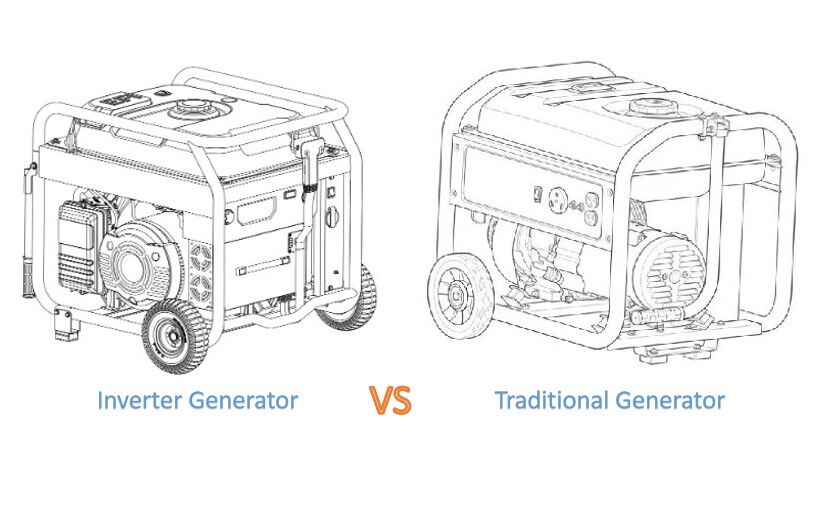Advantages of Inverter Generators Over Traditional Generators
On this page
In the context of increasing energy demands and the pursuit of high-quality electricity, inverter generators are gradually replacing traditional generators as an advanced power generation technology. Known for their fixed output power and larger size with significant noise, traditional generators are being outshined by inverter generators, which are gaining attention for their superior fuel efficiency, stable current quality, and more environmentally friendly design. This article will provide a detailed comparison between inverter generators and traditional generators, covering aspects such as working principles, fuel efficiency, output stability, starting capability, noise levels, structural design, voltage stability, adaptability, and environmental performance, to help users understand the advantages of inverter generators and their application scenarios.

Inverter generators and traditional generators differ fundamentally in the way they convert energy. Traditional generators first generate inferior alternating current by burning fossil fuels such as diesel, propane, or gasoline. This current is then converted into direct current power, which is finally transformed back into high-quality alternating current. In contrast, inverter generators directly extract electricity from the fuel and use inverter technology to produce stable alternating current, which is particularly suitable for high-precision electronic devices such as smart phones, air conditioners, televisions, and microwave ovens.
Inverter generators excel in terms of fuel efficiency and output stability, with key advantages below.
Inverter generators can adjust the engine speed according to the actual load, optimizing fuel usage efficiency, reducing fuel consumption, and lowering the cost of power generation. Unlike traditional generators, which have a fixed output power, their operating noise, fuel consumption, and power output remain unchanged regardless of the load.
Inverter generators can provide more stable voltage and current waveforms, suitable for equipment with high demands on energy quality. The output waveform and voltage stability of traditional generators are relatively poor and not suitable for long-term use with high-precision equipment.
Inverter generators have significant advantages in starting capability and current quality.
For example, a 2000W-rated inverter generator can start a 1.5P (approximately 1200W rated power) air conditioner, while a traditional generator would require about 3000 watts to start the same equipment. This is because inverter generators have higher flexibility and stability during the current conversion process.
Inverter generators can provide higher quality current, reducing power fluctuations and ensuring smooth energy output. Traditional generators have shortcomings in current quality, which can lead to unstable performance of electrical equipment.
Inverter generators have clear advantages in structural design and noise control.
Inverter generators typically have a more compact design, eliminating the flywheel and heavy stator and rotor found in traditional generators, using a 12V mini motor that is converted into a 220V power source through an inverter. This makes inverter generators smaller and lighter. For example, a 2KW inverter gasoline generator weighs 14.5KG and measures 49x29x46cm, while a traditional 2KW gasoline generator weighs up to 45KG and measures 59x43x45cm.
Due to their fully enclosed housing and 2cm thick sound-absorbing cotton, inverter generators can significantly reduce noise, providing a quieter working environment. In contrast, traditional generators are noisier and typically generate higher noise levels during operation. The noise of inverter generators is usually 10-15 decibels lower than that of traditional gasoline generators, making them particularly suitable for residential areas, camping, and other noise-sensitive locations.
Inverter generators perform better in terms of voltage stability and adaptability.
The output voltage of inverter generators is stable, with fluctuations not exceeding 4V, and the output waveform is a sine wave, consistent with the grid power. Traditional gasoline generators have relatively poor voltage stability, with a fixed output voltage that is difficult to meet the high demands of loads that require changes in energy frequency.
Inverter gasoline generators can automatically adjust the speed according to the size of the load, providing precise energy control. The speed of traditional gasoline generators is fixed and difficult to adapt to the requirements of load changes for energy frequency.
Inverter gasoline generators stand out more in terms of environmental performance. The design of inverter gasoline generators reduces greenhouse gas emissions, making them more environmentally friendly than traditional gasoline generators. However, compared to the zero-emission operation of wind and solar power generation, the environmental performance of inverter gasoline generators still has some gaps.
Many inverter generators have parallel compatibility, allowing two or more generators to be connected together to increase power output. This feature enables inverter generators to simultaneously power high-power equipment and multiple devices, suitable for applications that require high power output.
Inverter generators excel in modern power generation needs with their higher fuel efficiency, stable current quality, lower noise levels, and more environmentally friendly design. Although their price is relatively high, in the long run, their energy-saving and low-noise advantages can bring higher economic benefits and comfort of use. For users who need high-precision power equipment, inverter generators are undoubtedly a worthwhile investment.
